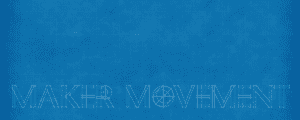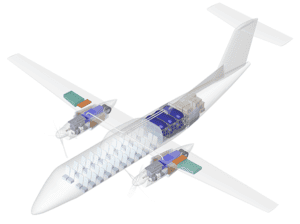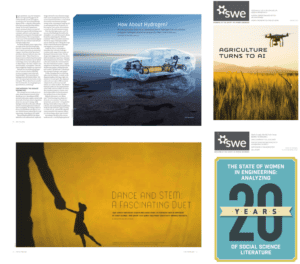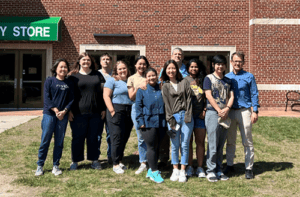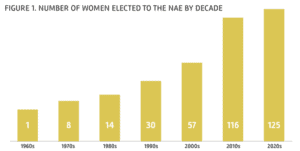Shedding light on the relationship between gender equity and research equality, the Gender Summit aims to change research norms.
By Marsha Lynn Bragg, SWE Associate Editor

The Gender Summit (GS) has worked to increase understanding of the relationship between gender equity and research equality. The summit — launched in 2011 as an international forum for scientists, gender scholars, stakeholders, and policymakers — provides space to examine new scientific evidence showing when, why, and how biological sex and or sociocultural gender differences impact research results and differentiate outcomes for women and men. The Gender Summit seeks to make gender equality in science and research the norm and promote the inclusion of the gender dimension in STEM research.
Elizabeth Pollitzer, Ph.D., director of Portia Ltd., U.K., is founder and one of the chief organizers of the summit. Portia Ltd. is a London-based not-for-profit founded by women scientists from the Imperial College London to advance understanding of gender issues in science participation, in organizational practices, and in research outcomes. She works closely with the Elsevier Foundation led by Ylann Schemm, executive director and co-chair of the foundation’s gender equity taskforce. Based in Amsterdam, the Elsevier Foundation is Elsevier’s grant-funding arm and part of its corporate responsibility program, which centers its contributions to reducing inequalities and promoting sustainable development in gender, health, and climate action. Elsevier is a global information analytics corporation that helps researchers and health care professionals advance science and improve health outcomes by offering access to journals and a huge database of published studies.
The two organizations came together for the first GS when the Elsevier Foundation expressed interest in becoming a sponsor, Dr. Pollitzer said. “It became immediately clear that our interests and missions overlap and from the second Gender Summit, the foundation has been a partner of each event.” The partnership benefits both organizations: The foundation recommends speakers, editors, researchers, and communication channels, she said, while GS provides Elsevier opportunities to learn how to improve science communication and their own practices such as promoting women to editorial positions and training early-stage researchers on how to incorporate sex and gender analysis into research, among other goals.
According to Schemm, the Gender Summit has been crucial to the foundation’s journey as an organization and as curators of research. “This is one of the reasons that we also supported the expansion of the Gender Summits in developing and emerging countries since 2015. The Gender Summits provided an essential space for this critical work. As a member of Elsevier’s inclusion and diversity board, Dr. Elizabeth Pollitzer continues to guide us in our efforts to contribute to a more equitable research ecosystem,” Schemm said in a foundation news release.
This year was no different. Gender Summit 22, or GS22 EU, took place virtually in late October, the consequence of a global pandemic that continues to affect aspects of society and alter human interactions. Although Dr. Pollitzer said she misses the energizing impact of face-to-face meetings, she recognizes that using the Meetyoo virtual platform allows those who don’t have time or cannot afford to travel to benefit from participation. In this sense, she said, the virtual format is more inclusive.
“Applied research is very often motivated or justified by promising to solve societal challenges, but all too often gender is not considered as being relevant to delivering on this promise with equal quality outcomes for all.”
– Elizabeth Pollitzer, Ph.D., director, Portia Ltd., U.K.; founder, Gender Summit
Theme-based summits focus on countries’ goals
The Gender Summit is held in different regions, Dr. Pollitzer said, so organizers must make sure that the theme represents the needs and condition of the country or region serving as host. Themes such as climate change or career progress in STEM research may overlap, she said, yet the context will vary as will the ways improvements can be achieved based on local conditions. These include how gender is understood, historical roots of inequality, whether sufficient gender expertise is available, and if institutions are favorable to seeing research quality through the prism of gender (in)equality, she said.
The GS22 EU theme, “Gendered interactions between diversity and quality in research/Science knowledge for an equitable and just future,” reflects two important trends in the development of the summit as a platform for dialogue, Dr. Pollitzer said. “The first one is that the concept of ‘gender’ has become more complex, and its understanding should include recognition of interrelated factors such as sex, ethnicity, social status, race, age, and other factors.
“The second is that applied research is very often motivated or justified by promising to solve societal challenges, but all too often gender is not considered as being relevant to delivering on this promise with equal quality outcomes for all,” she said.
With this in mind, for GS22 EU participants were asked to explore what fairness, justice, and sustainability mean from scientific and gender equality perspectives. Participants were also asked to identify ways to ensure that women and men have the same opportunities to participate in shaping the transition processes as researchers, innovators, entrepreneurs, citizens, and consumers. GS22 EU sought to advance gender equality as a lever in achieving the European Green Deal, Digital Europe, and the EU’s Sustainable Development Goals agenda.
In addition to matching the GS theme to the needs and initiatives of the host country, each summit must also have a partnership with local influential science institutions in place first, Dr. Pollitzer said. Among organizations joining the foundation to support GS22 EU were the German Federal Ministry of Education and Research, the German Research Foundation, the Center for Gendered Innovations in Science and Technology Research, and the African Institute for Mathematical Sciences/Women in Stem Initiative.
As with all previous summits, GS22 EU featured nearly 70 speakers from academic, scientific, nonprofit, and research institutions in Iceland, France, Scotland, Germany, Nigeria, and Mexico, among other countries, along with plenary and parallel sessions, poster presentations, exhibitions, and networking opportunities, much like one would expect during an in-person gathering. Portia Ltd. prepares reports and includes the recommendations presented at the summit for the European Commission and European Parliament. The report is also accessible to the scientific and research communities and other interested parties. Access to virtual events remains on the GS website for about 10 weeks after the event ends.
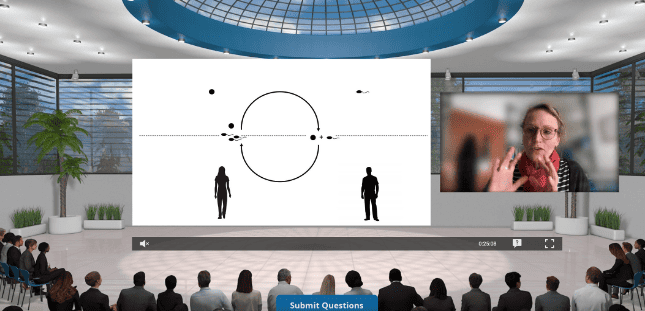
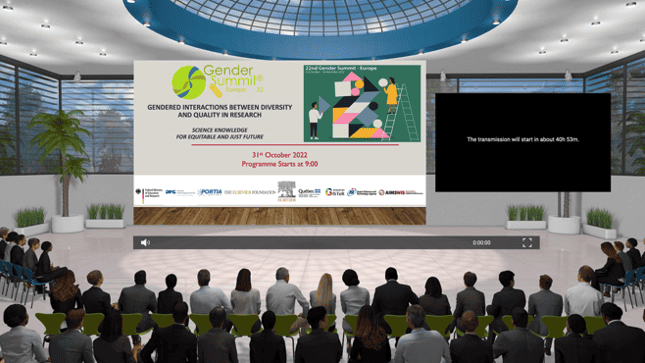
Summits make regional headway
Originally the GS focused on European countries to ensure the Horizon 2020 — the European Union’s biggest research and innovation funding program — included gender-related projects. The first-ever summit in Brussels attracted a global audience with great interest in the concept of gender equity in science research. The European Parliament hosted the second summit, and the third one took place in the States, made possible through the collaboration with science institutions in the United States, Canada, and Mexico.
Referred to as Gender Summit – North America, the National Science Foundation served as the main host and worked with the Society of Women Engineers to bring it to Washington, D.C., in 2013. In addition to Portia Ltd., other sponsors included the Natural Sciences and Engineering Research Council of Canada, the National Council on Science and Technology of Mexico, the U.S. National Institutes of Health, and the Canadian Institutes of Health Research. Beginning in 2015, the summit expanded into Africa, Asia-Pacific, Latin America, and in 2017, in Jordan as the Gender Summit – Arab World.
These summits are the outgrowth of genSET, a two-year European Union-funded project begun in 2010, which for the first time, actively engaged science leaders in examining evidence on gender issues in STEM. Through a series of seminars, workshops, and symposia coordinated by Portia Ltd., genSET brought together gender experts and leaders of scientific institutions who evaluated then-available empirical evidence and concluded that gender equality is critical for research because it interconnects and affects many areas — from scientific endeavors to institutional practices to science-knowledge making, among others.
Having made this observation, science leaders reached out to the European Commission advising that what the project uncovered should be made available to others. The commission is a 27-member executive and strategic body that advises, proposes, and enforces the laws and policies of the European Union. The genSET project laid the groundwork for STEM researchers and scientists to factor the role of gender in their work.
“The concept of ‘gender’ has become more complex, and its understanding should include recognition of interrelated factors such as sex, ethnicity, social status, race, age, and other factors.”
– Elizabeth Pollitzer, Ph.D., director, Portia Ltd., U.K.; founder, Gender Summit
Today’s gender summit
Since the first Gender Summit, 22 two-day events have been offered with 11,000 registered participants from 40 countries and 1,800 speakers. The GS newsletter has 7,000 subscribers, Dr. Pollitzer said. “Different Gender Summits benefited from keynote speeches by government ministers, heads of corporations, and presidents of leading institutions,” she said, adding that these gatherings have influenced key players in the science knowledge ecosystem to change their own processes and practices and contribute to the quality of research.
“The argument that has been most influential in bringing scientists and science policymakers into the discourse on gender issues in STEM is its evidence-based aspect,” she said, noting for example that science excellence suffers when gender issues are ignored in research, and that bias and gaps on gender in science knowledge lead to innovations and applications with worse outcomes for women and other underrepresented groups.
Dr. Pollitzer and Portia Ltd. continue to network with the speakers and use the presentations for training purposes. Plans are underway to present two summits in 2023, Gender Summit – North America, with Quebec serving as host country, and Gender Summit – Africa, hosted by Ghana. Portia Ltd. will use a hybrid format providing hubs in various locations within Africa, offering opportunities for small groups of people to gather depending on logistical capabilities.
“Our thinking now is that having a part of the program delivered virtually could work well in other geographically large and diverse regions,” Dr. Pollitzer said. “It will help Gender Summit contribute to achieving sustainability goals and be inclusive to organizations and participants who might not have the necessary economic means or time to travel.” She would also like to establish a U.S., Mexico, Canada partnership reminiscent of the Gender Summit – North America in 2013 that produced a “Roadmap for Action for North America” and use that event’s 10th anniversary to assess what has been achieved and what remains to be done.
Gender Summit programming and reports are available on the Gender Summit website, gender-summit.com.

